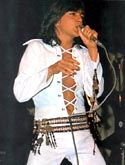
"Monkey in a cage?"
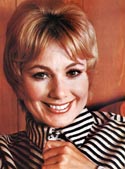
America's favorite Mom!
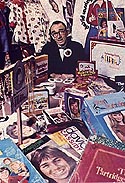
Screen Gems' V.P., "Hone$t" Ed Justin with his PF merchandise
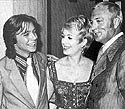
The Cassidys
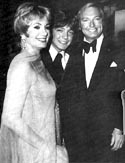
At the Emmy Awards
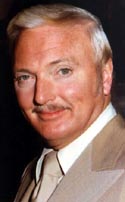
"Incredible human being"
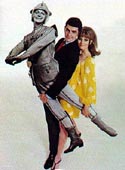
"He & She"
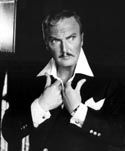
Jack, as his idol, John Barrymore in the drama, "W.C. Fields and Me"
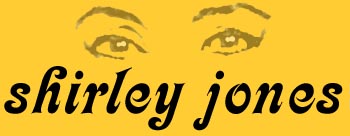
CONTINUED
GH: Itís
one thing to have the responsibility of being a mother to your own kids,
but how did you handle the fact that all these kids were camping on your
front lawn, wanting you for their mother as well?
SJ: It was sad actually. I felt really sorry for these
people. First of all, they thought David lived in my house, which he didnít.
That was a big problem, Secondly, they wanted me to be their mother. So
it was a very sad situation. Sometimes I would give them bus fare to go
home or get a telephone number and call their family. In many ways, that
made me nervous about the show, because I felt this show was such a fantasy
for these people.
GH: Well,
you were the perfect mother!
SJ: But it was a fantasy. I felt maybe we were doing something
wrong here in allowing these kids to believe this.
GH: It
also gives you an awful lot of unsolicited responsibility.
SJ: Exactly! Thatís for sure.
GH: Did
you participate in royalties from the merchandise?
SJ: I donít recall us having that deal, no. I was in on
the records, but I think we did the merchandising later. It was one of
those things that was left out and we had to do redo the contract.
GH: Is
that around the time when David reworked his contract?
SJ: Exactly. Thatís when it happened.
GH: Around
this time [1972] Jack asked you for a separation. You had to deal with
this on top of leading a series. Was this a difficult period for you?
SJ: Oh, very much so.
GH: How
long were you apart?
SJ: About a year.
GH: When
the two of you reunited, you formed a touring show. What can you tell us
about that?
SJ: It was called The Marriage Band. It was a whole show
that had a storyline about marriage. We had singers and dancers and opened
at the MGM Grand in Vegas. We toured with it to about 20 cities, then brought
it back to Vegas.
GH: When
would you tour?
SJ: I believe it was during the summer, when we were on
hiatus.
GH: What
events finally made you decide that the marriage wasnít going to work?
SJ: Jack had a breakdown. A real mental breakdown. He
was manic depressive. But he was the one that wanted the divorce.
He thought it was better for me and the kids. I never did. I would have
hung in there. I felt in many ways he was acting strangely and doing strange
things and he felt perhaps it was better for all of us.
GH: Recent
TV specials and movies seemed to focus on the "dark" side of Jack. Obviously
there was quite a "bright" side as well. Rather than focus on the dark,
what can you tell us of the bright?
SJ: He was an incredible human being. Incredibly talented,
number one! He had this charisma that, when he walked in the room, not
only women fell all over him, but men did too. He attracted everybody.
He had a great, great sense of humor, which of course was the first attraction
for me. Obviously Iím attracted to men with a sense of humor! (Laughs)
Thatís the biggest thing. Not to mention he was as handsome as he was.
For me, that was the least of it. The fact that he could make jokes about
himself and that he didnít take himself that seriously made him interesting
and exciting.
GH: He
had such an incredible range in his talent. He could go from broad comedy
to dark drama. Not too many actors have that range.
SJ: Exactly! He did that He & She [comedy]
series.
GH: And
he got great revues in that.
SJ: Yes, he did! And everything that he touched on Broadway
was his show. I donít care who the star was. If Jack was
in the show, he got the revues.
GH: After
a while, David became dissatisfied with his role as Keith and the confusion
the public had between David/Keith. Did that conflict spill over onto the
set at all?
SJ: He voiced it and you would see it at times. David
had his moods as well, and towards the end, was very unhappy with the series
and the image that was out there. He wanted to change. He wanted to try
and change. So every once in a while he had a problem. He was pretty good
about it. David is a pro. He knew what he had to do and he was very good
at his responsibility.
GH: One
of the ways David tried to change his public image, was to be interviewed
and photographed semi-nude for Rolling Stone magazine. What was
the atmosphere like on the set and with Screen Gems?
SJ: I donít think they were too thrilled. He was the teen
idol of America whose audience was primarily 8 or 9 year old girls. So
I think they were afraid there was going to be an explosion there with
the parents of these children and his audience.
GH: How
did you feel about it? Were you upset?
SJ: No. It was his choice. I didnít guide Davidís career
or tell him what to do.
GH: Were
you afraid that it would affect the showís ratings?
SJ: No. Actually, I was really looking out for what was
right for David. We have the same manager, so obviously she thought it
was the best thing to happen for him.